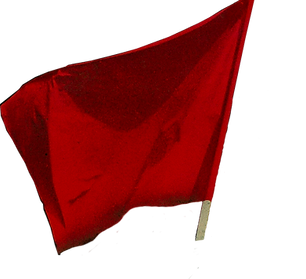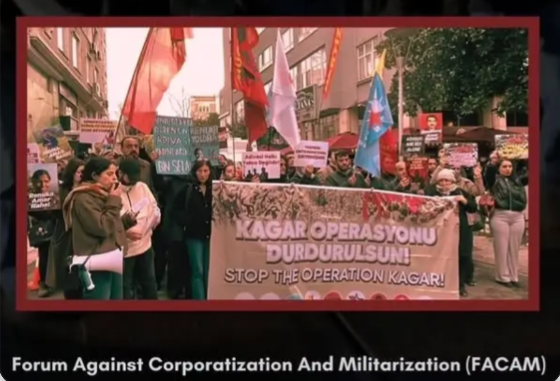Interview with „Partija Rada“ on the conflict between Serbia and Kosovo
- Redaktion Die Rote Fahne
- 23. Apr. 2023
- 6 Min. Lesezeit
Aktualisiert: 17. Nov. 2023

Here we want to publish an interview, which was made from The Red Flag with the „Partija Rada“ (Party of Labour) from Ex-Yugoslavia. The interview is about the lately sharpened conflict between Serbia and Kosovo, which is an expression of the sharpening contradictions between the imperialists and also between the imperialists and the oppressed peoples and nations. The Partija Rada (Labor Party) gives its positions and assessments on the question of imperialist influence and interests in the region, their comprador regimes and the perspective of the antiimperialist and revolutionary forces.
The Partija Rada showed in the previous years many times their firm internationalist and antiimperialist stance, with their work in Ex-Yugaslavia, as well as together with other antiimperialist forces. For example they called with revolutionary and antiimperialist organizations from Bulgaria, Austria and Turkey for uniting against the European Union, especially its antidemocratic elections and anti-peoples character in terms of the Covid-Pandemic. Also the defense of the Peruvian Communist Dr. Abimael Guzmán, known as Chairman Gonzalo, which was murdered by the old Peruvian State and the CIA, was a clear common position of the antiimperialist and revolutionary forces in that region.
In terms of discussion and debate, we want to note as editorial staff of the The Red Flag, that we are not sharing the position that the main contradiction in Ukraine is the interimperialist contradiction. The main contradiction in Ukraine we estimate as the contradiction between Nation and Imperialism, though the contradiction between the imperialists plays also a meager role. The task for an independent and sovereign Ukraine is part of the struggle of all oppressed and exploited masses on a world scale against imperialism.
We thank the Parija Rada for the possibility to publish this interview and see it as contribution for the orientation and discussion of the revolutionary and antiimperialist forces.
The Red Flag: With the end of the year 2022 the conflict between Serbia and Kosovo has come to a head again, there were blockades of Serbian people in Kosovo, and both the NATO units of KFOR and the Serbian army were mobilized. What is this conflict about?
Partija Rada: The Party of Labor believes that the ongoing tensions that periodically break out in Kosovo, as an expression of the most reactionary and megalomaniacal ideas of the comprador Balkan regimes, are an expression and an integral part of a wider inter-imperialist conflict. In particular, the conflict between American imperialism on the one hand and Russian imperialism on the other, and cannot be viewed separately from the current inter-imperialist war in Ukraine. The existing tensions, in addition to having an internal use for the regimes in Belgrade and Pristina to keep the masses in submission, cannot lead to new conflicts in Kosovo, for the simple reason that they do not have the strength for it, do not want an open conflict, nor do they currently have the support from the biggest imperialists for it, until the biggest imperialists decide or are forced to open the so-called Balkan front. The issue of Kosovo is not so much on the agenda, but the issue of Serbia. Kosovo can be one of the starting points in the Balkans if the inter-imperialist conflict is further spread. Whether the war from Ukraine will spread to the Balkans itself depends on the results of the inter-imperialist conflict on the main front. The comprador regimes of Serbia and Kosovo, in their servility and impotence, play the tragicomic role of ordinary pawns in this broader conflict.
The Red Flag: A few years ago, the so-called "non-papers" were published, which were about the redistribution of the Balkan countries. Now we hear that Serbia should "choose between Russia and the West". What is the role of the imperialists, and what are their goals in the region?
Partija Rada: Different imperialists have different interests and their alliances are merely temporary in character. But one thing that unifies them all is the fact that contradictions between them are sharpening and both secret and public diplomatic means are becoming less and less capable of solving them. The masses in the territory of the former Yugoslavia have learned a lesson from decades of warfare, and they do not want new conflicts, nor can the regime's nationalist rhetoric lead to a resurgence of militant nationalism and the earlier level of chauvinistic hatred between peoples. However, Serbia is forced to "choose between Russia and the West" and this opinion becomes dominant not only among the bourgeoisie itself, but also imposes itself on the masses, not only in Serbia, but also in Montenegro, Bosnia and Herzegovina, and even in Croatia. And that's the main point - whether you're for Russia or the West, in the coming period it will suppress all those daily political tensions from nationalist positions. At the same time, this division can lead to new tensions, political instability and even conflict, if an external factor is involved more aggressively. American imperialism and the entire West are in a hurry to completely suppress Russia and its influence from the Balkans, as well as to limit China's economic influence in the Balkans. Until then, Russian imperialism through Serbia is fighting frantically not to be suppressed and will try to consolidate its interests in Serbia, at the cost of destabilizing Serbia and beyond, especially if the conflict on the main front escalates.
The Red Flag: Why does Serbia not want to recognize Kosovo as a state? What is your position on this?
Partija Rada: Other than being pawns in the imperialist conflict, „Greater Serbia“ has always been an aspiration of the Serbian bourgeoisie. This aspiration is reactionary in essence and megalomanic unrealistic in form. Currently, various fractions of the Serbian bourgeoisie speak of creating a „Serbian World“ in the Balkans. They are ready to surrender to whoever imperialist can help in realizing this goal. After the Balkan Wars of 1912, most of Kosovo was taken from the Ottoman Empire by the Kingdom of Serbia, and Metohija was taken by the Kingdom of Montenegro. Not long after, as the result of the Treaty of London in 1913, an independent Albania was recognized, but a large number of Albanian people remained in neighbouring countries such as Montenegro and Serbia. Belgrade took a colonial stance towards the Albanian people in Kosovo, committing ethnic cleansing and systematically expelling the Albanian population. This national oppression briefly came to a halt, when the Albanian people in Kosovo fought against fascism, shoulder to shoulder with the Yugoslav and other anti-fascist forces, being convinced that they’ll be allowed to decide for themselves on democratic grounds whether they’ll be united with Albania or remain an autonomous part of Yugoslavia. But this did not happen, as the megalomaniac ambitions of Yugoslav revisionists implied a nationalistic and chauvinistic attitude towards the people of Kosovo. The Albanian people in Kosovo have successfully liberated themselves from the Serbian regime, but the result of this is merely a change in their masters. Having rejected the ideological platform on which it was founded, the movement for free and independent Kosovo has transformed into merely a tool of American imperialism in the region. The current comprador regime in Kosovo is also following that path. Since its founding, the Party of Labor has supported the just struggle of the Albanian people for independence and self-determination. And nothing has changed there. We can only discuss whose side the masses in Kosovo and Serbia will take during the escalation of inter-imperialist conflicts - whether they will be forced under one NATO banner or against each other.
The Red Flag: Kosovo can be characterized as a colony of the "Western" imperialists. 3.500 soldiers of the KFOR "peacekeeping mission" are stationed in the country. What perspective is there for the people in Kosovo, and what is the position of the anti-imperialist and revolutionary forces in the region?
Partija Rada: The presence of NATO forces in Kosovo and beyond in the Balkans, regardless of the name they formally bear, is increasing day by day. New NATO bases are being opened all over the Balkans and new bases are being built as military fortifications. The number of soldiers is piling up, the supply of weapons is increasing, and additional militarization of the Balkan states is taking place. This is, of course, for the occupation of the Balkan states, the protection of the economic interests of imperialism, the looting of resources, and the control of trade and energy routes. But basically, the American and European imperialists fear that by escalating the conflict on the territory of Yugoslavia, the war could spread wider and threaten their strategic interests in the Mediterranean itself, especially in the case of a conflict between Greece and Turkey, etc. However, the issue of Kosovo is of great importance not only for the people who live there, but also for oppressed people from all over the Balkans. The revolutionary forces in the Balkans believe that to defeat imperialism and its lackeys, it is a historical necessity that the progressive parts of the Albanian movement in Kosovo build strong ties not only with the progressive people of Serbia and the Serbs in Kosovo but also with the entire Balkan region. For the people of Kosovo, this means that the fight against the reactionary politics of Belgrade must further develop into a fight against the presence of the imperialists in the Balkans, and against the comprador capitalists in Kosovo and Albania.
Currently, the revolutionary forces in the region are small, and without personal influence in the masses. But for the revolutionary subject in the Balkan nations to be capable of the historical role of liberating the Balkan nations, it must fight to overcome its weaknesses, first of all, to come out of its strategic defensive and opportunistic positions with a clear ideological line, which is also present in what we call the revolutionary movement in Europe.
Image source: Location of Kosovo and Serbia, Tukish Flame, Wikimedia (CC BY-SA 3.0)






Kommentare